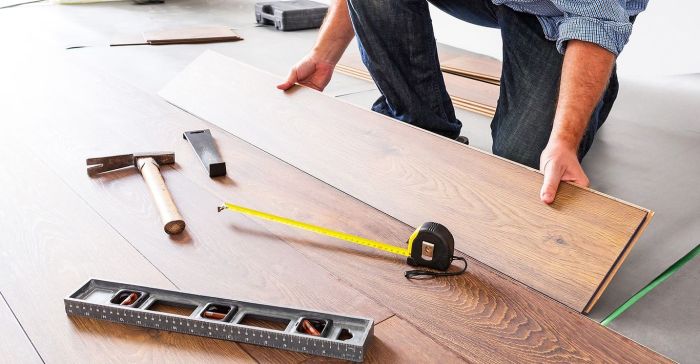Flooring installation deals near me. Starting off with the best ways to save on flooring installations right in your area, this article aims to guide you through the process with valuable insights and tips.
Exploring different flooring materials, comparing pricing packages, and understanding the importance of hiring the right professional or considering a DIY approach are all part of the discussion.
Researching Flooring Installation Deals: Flooring Installation Deals Near Me
When looking for the best flooring installation deals, it’s essential to do thorough research to ensure you get the most value for your money. Here are some key points to consider:
Types of Flooring Materials
- Hardwood: Known for its durability and timeless appeal, hardwood flooring is a popular choice for many homeowners.
- Laminate: A cost-effective alternative to hardwood, laminate flooring offers a wide range of styles and colors.
- Tile: Durable and easy to maintain, tile flooring comes in various materials such as ceramic, porcelain, and natural stone.
- Carpet: Soft and comfortable underfoot, carpet flooring is available in different textures and patterns.
Reputable Flooring Installation Companies
- ABC Flooring: Known for their quality workmanship and excellent customer service.
- XYZ Flooring: Offers competitive pricing and a wide selection of flooring options.
- 123 Flooring Experts: Specializes in custom flooring solutions tailored to your specific needs.
Pricing and Packages
- It’s important to compare pricing and packages offered by different flooring installation providers to ensure you’re getting the best deal.
- Look for companies that offer discounts on materials or installation services to help you save money.
Reading Reviews and Checking References
- Before choosing a flooring installer, be sure to read reviews and check references to ensure they have a good reputation.
- Ask for referrals from friends or family members who have recently had flooring installed to get recommendations.
Types of Flooring Materials
When it comes to choosing the right flooring material for your space, there are several options available, each with its own unique characteristics and benefits. Here, we will explore some common types of flooring materials and their maintenance requirements.
Hardwood Flooring
Hardwood flooring is a popular choice known for its durability and timeless appeal. It adds warmth and elegance to any room and can increase the value of your home. Hardwood floors are relatively low maintenance, requiring regular sweeping and occasional refinishing to keep them looking their best.
Laminate Flooring
Laminate flooring is a cost-effective alternative to hardwood that mimics the look of wood or stone. It is easy to install and maintain, making it a popular choice for high-traffic areas. Laminate floors are resistant to scratches, stains, and fading, making them a durable option for busy households.
Vinyl Flooring
Vinyl flooring is a versatile and affordable option that comes in a wide range of styles and colors. It is water-resistant and easy to clean, making it ideal for kitchens, bathrooms, and other areas prone to moisture. Vinyl floors are also comfortable underfoot and offer noise reduction properties.
Carpet Flooring
Carpet flooring is known for its softness and warmth, making it a cozy choice for bedrooms and living rooms. It comes in a variety of textures and colors to suit any decor style. Carpet requires regular vacuuming and occasional deep cleaning to maintain its appearance and prolong its lifespan.
Hiring a Professional Installer
When it comes to getting your flooring installed, hiring a professional installer is crucial to ensure a successful and high-quality outcome. Here are the steps involved in hiring a professional flooring installer and some tips to help you through the process.
Checking Licenses and Insurance
It is essential to check the licenses and insurance of flooring installers before hiring them. This ensures that they are qualified to do the job and have the necessary coverage in case of any accidents or damages.
- Verify the installer’s licensing: Make sure the installer has the required licenses to perform flooring installation in your area.
- Check insurance coverage: Ensure that the installer has liability insurance and worker’s compensation insurance to protect you and your property during the installation process.
Negotiating Pricing and Discounts
Negotiating pricing and asking for discounts can help you save money while still getting quality flooring installation services. Here are some tips to keep in mind when discussing pricing with a professional installer.
- Get multiple quotes: Compare quotes from different installers to get an idea of the average pricing in your area.
- Ask for discounts: Inquire about any ongoing promotions or discounts that the installer may offer. You can also negotiate the price based on the scope of work and materials needed.
- Bundle services: If you have multiple rooms or areas that need flooring installation, consider bundling the services to get a better deal.
DIY Flooring Installation

When considering a DIY flooring installation project, it’s important to be well-prepared with the right tools and materials. While it can be a cost-effective option, there are pros and cons to weigh against hiring a professional installer. Here, we’ll discuss the necessary tools and materials, as well as the step-by-step process for installing different types of flooring on your own.
Tools and Materials Needed for DIY Flooring Installation
Before starting a DIY flooring installation project, it’s essential to gather the following tools and materials:
- Measuring tape
- Pencil
- Safety goggles
- Gloves
- Knee pads
- Utility knife
- Hammer
- Level
- Underlayment
- Flooring adhesive or nails
- Chalk line
- Saw (depending on the type of flooring)
Pros and Cons of DIY Flooring Installation versus Hiring a Professional
When deciding between DIY installation and hiring a professional, consider the following:
DIY Flooring Installation:
- Pros:
- Cost-effective
- Sense of accomplishment
- Flexibility in scheduling
- Cons:
- Time-consuming
- Potential for mistakes
- No warranty for workmanship
Hiring a Professional:
- Pros:
- Expertise and experience
- Quicker installation
- Warranty on workmanship
- Cons:
- Higher cost
- Limited scheduling options
- Dependence on external service
Step-by-Step Guide for DIY Flooring Installation, Flooring installation deals near me
Here’s a general guide for installing different types of flooring on your own:
- Prepare the subfloor by ensuring it is clean, dry, and level.
- Acclimate the flooring material to the room’s temperature and humidity.
- Measure and cut the flooring to fit the space, leaving expansion gaps as needed.
- Install the underlayment according to the manufacturer’s instructions.
- Begin laying the flooring from one corner of the room, following the pattern or design you desire.
- Secure the flooring in place using the appropriate method, whether it’s adhesive, nails, or clicks.
- Finish the installation by adding transitions, baseboards, or trims to complete the look.
Ending Remarks

In conclusion, securing the ideal flooring installation deals near you involves careful research, decision-making, and possibly some negotiation. By utilizing the information provided, you can make informed choices and transform your space affordably and efficiently.